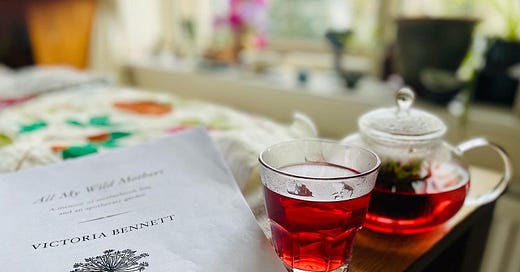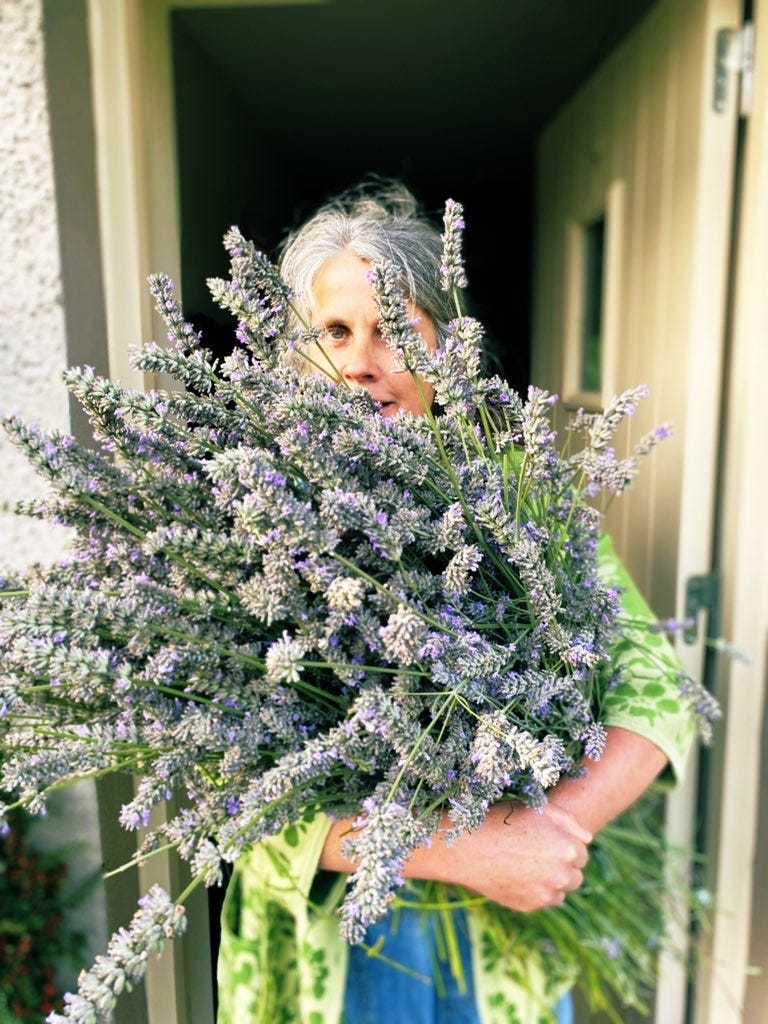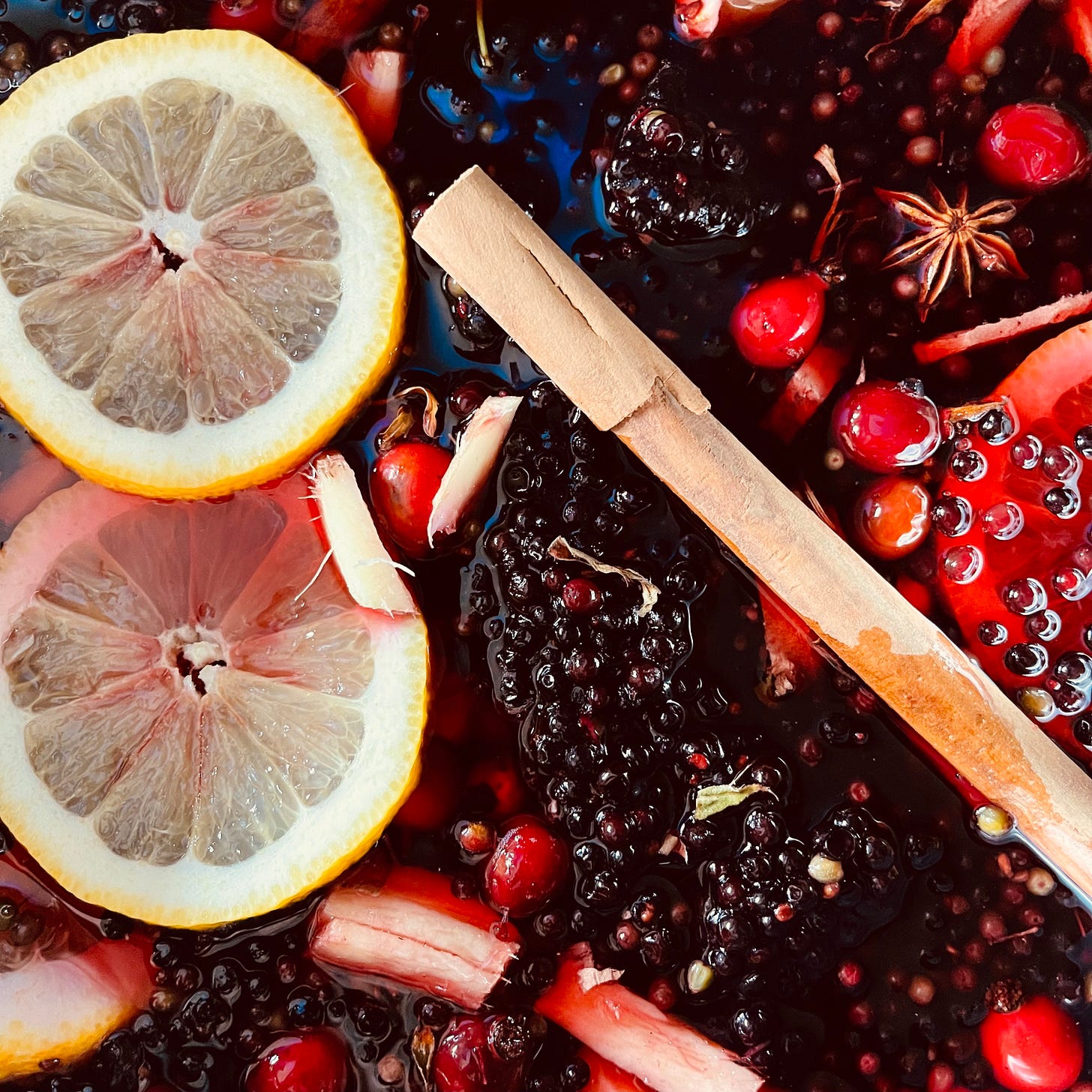‘… Together, my son and I gather in the seeds, an echo of our last leaving, until our bag is full with black poppy, calendula, mallow, foxglove, corncockle, shiny columbine. In the bog garden, tall flag iris bend and brown. Mint stiffens and silvers between the stones. Nettles sway at the edge of the fence. We leave these be, as food for the birds when the days grow cold. …’ (Extract - All My Wild Mothers - Victoria Bennett)
Recently, I have been dancing on spinning plates, juggling my health needs with the demands of caring for an elderly parent and home-educating my teenage son. I have also been finishing the final edits to my memoir. As the year turns another cycle and we move into autumn, I have been trying to give time to stop and acknowledge what this means in my life.
All My Wild Mothers started as a seed ten years ago, when I first moved to the housing estate where I live. At the time, I was broken by grief, struggling with being a carer, and the uncertainty of life on a low income in the face of economic austerity. For as long back in my life as I can remember, I have used writing to make sense of this world, either through the words of others, or through my own. They have been my constant in an often changing world. But, when grief took those words away, I wondered what I would become.
Like the former industrial ground on which the garden grew, it seemed an unlikely place to grow a story of hope.
Not able to create (it all seemed so pointless, so without meaning in the face of deep loss, I needed to see what could live. As autumn took hold, my four-year-old son and I started digging out the rocks and rubble beneath the thin topsoil and plant. A decade on, the garden is a wild, sustainable apothecary, and the seed planted between the hours of care is almost fully grown.
A book. A child. A life.
And yet, the garden still turns.
September is a contrary month and my favourite. So much of it is about endings — the slow creep into winter, the darkening days, the falling back of the garden - yet it also carries a curious quiver of energy - deeper, older, drawn from a knowing that this folding down into winter sleep is something deeply needed. It is like a yearning. A whisper to curl in a tight cocoon and let the small things grow in the dark. The harvest is a moment of remembrance, an honouring of the gifts it has brought, and what now passes into dark. But it is also a time of gathering, and preparing for what will come.
This week, I will mark my 51st birthday. As the year turns, I gather seeds from the meadow that was once a mowed green lawn. I pick damsons and blackberries for jam from trees and hedges we planted in. From the hedgerows near the house, I forage elderberries and rose hips, my son now tall enough to reach the higher branches. Like the damson tree, he has grown tall. I remember the feel of his hand in mine, the years moving by so fast. This is the wild garden I have grown. A book. A child. A life.
I don’t know what the next decade will hold. It feels so unsteady right now. But to be here, at this moment — to watch my son as he grows into his adult world; to see my story transform into a book that will make its way without me into other hands; to see the meadow we have nurtured sow its seeds for future years; to make jam from the trees we planted as saplings ten years gone — all this is beautiful.
All this grew from what was broken. It gives me hope.
(All My Wild Mothers is published by Two Roads Books - February 2023)
September Potion - Elderberry & Rosehip Syrup
In our house, September is a time for brewing batches of Elderberry and Rosehip Syrup to see us (and our friends) through the winter months, so here is my recipe. This makes just under 4 litres (made in a 5-litre jam pan).
Fill the pan with 2/3 elderberries - washed, stalks and leaves removed. Cover with 1/3 water. Add a couple of handfuls of rose hips - washed, stalks removed. Add 1 large lemon (sliced), 4 inches of chopped fresh ginger (if you can’t get fresh, you can use dried), 12 cloves, 3 cinnamon sticks, 12 juniper berries, and 3 star anise.
Bring to boil and boil for 10 minutes, stirring to avoid sticking, then simmer until the elderberries are soft and can be easily squished with a potato masher. Which is exactly what you do next.
The next bit gets messy and takes ages. Remove the cinnamon sticks and star anise. Cool and strain the mix through a muslin bag. You might want to wear gloves to do this as the dye is pretty strong.
Once the mix is strained through, put it back onto a moderate heat and add the sugar. This is to sweeten but also to help preserve. This quantity takes 2 big bags of caster sugar (I know!). If you want to check sweetness, you can add it in bit by bit and taste test. Bring to a boil, stirring to avoid creating scum. It should thicken slightly at this point. Hard boil for 10 minutes, then take off the heat and let cool a little bit before putting it into sterilised bottles. This batch filled 5 old whisky bottles.
If you prefer to use honey (I do if I can afford it), then do the boiling first and add honey at the end; otherwise, you destroy the goodness.
Daily Brew - Remembrance
I try to get into the garden each day and choose a brew. I use intuition and plant knowledge when choosing what ingredients to include (sometimes, especially in winter, I include dried or store cupboard ingredients). It is a quiet moment that helps me to connect to myself and the wild around me in a way that has now become a daily practice.
I prepare the brew in my glass pot (my biggest treat, so I can see the colours change) and drink hot and cold through the day.
This brew is for remembrance, balance, and calming my centre - rosemary, mint, calendula, sage, star anise, cinnamon, angelica seed, pomegranate blossom and liquorice root.
Plant of the Month - Hawthorn
Crataegus spp
May-tree, hagthorn, quickset, hawberry, bread-and-cheese
Hawthorn has a long association with death and rebirth and is a traditional remedy for soothing heartbreak and grief. Antioxidant, anti-inflammatory, and astringent, it has been used to treat coronary artery disease, reduce cholesterol, dilate blood vessels, strengthen and regulate the heartbeat, treat nervous energy, improve mood, and soothe sore throats. An appetite suppressant, it was commonly eaten as a meal supplement when food was scarce, earning itself the name of ‘bread and cheese’.
Hawthorn is a hardy hedge tree and adaptable to most soils.
*NOTE - hawthorn, as with all plant remedies, should not be taken without professional guidance if you are pregnant, have additional health issues or are on any medications.
Invitation
Hawthorn is regarded as a sacred plant and a portal to the unseen. As we enter the turn of the seasons, what are you welcoming, and what are you leaving behind? What parts of you need to rest? Are you at a portal point in your own life? Take stock, and see what seeds you have gathered in your life to help you in this point of change.
That’s all for now - I’ll see you soon.
PS I hope you have found something for your September days in this newsletter. I’d be delighted if you shared it, but please remember that the copyright for all text and images is my own.












Thank you Vik, a wonderful September post. I shall bookmark it and dip back in again.
Beautiful rendition of autumn.